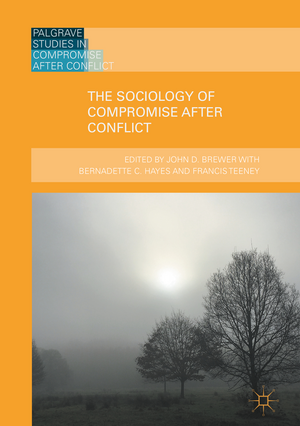The Sociology of Compromise after Conflict: Palgrave Studies in Compromise after Conflict
Editat de John D. Breweren Limba Engleză Hardback – 16 iul 2018
This book introduces a new and original sociological conceptualization of compromise after conflict and is based on six-years of study amongst victims of conflict in Northern Ireland, South Africa and Sri Lanka, with case studies from Sierra Leone and Colombia. A sociological approach to compromise is contrasted with approaches in Moral and Political Philosophy and is evaluated for its theoretical utility and empirical robustness with in-depth interview data from victims of conflicts around the globe. The individual chapters are written to illustrate, evaluate and test the conceptualization using the victim data, and an afterword reflects on the new empirical agenda in victim research opened up by a sociological approach to compromise. This volume is part of a larger series of works from a programme advancing a sociological approach to peace processes with a view to seeing how orthodox approaches within International Relations and Political Science are illuminated by the application of the sociological imagination.
| Toate formatele și edițiile | Preț | Express |
|---|---|---|
| Paperback (1) | 582.30 lei 6-8 săpt. | |
| Springer International Publishing – feb 2019 | 582.30 lei 6-8 săpt. | |
| Hardback (1) | 730.35 lei 6-8 săpt. | |
| Springer International Publishing – 16 iul 2018 | 730.35 lei 6-8 săpt. |
Din seria Palgrave Studies in Compromise after Conflict
- 18%
 Preț: 727.80 lei
Preț: 727.80 lei -
 Preț: 332.14 lei
Preț: 332.14 lei -
 Preț: 380.63 lei
Preț: 380.63 lei -
 Preț: 387.75 lei
Preț: 387.75 lei - 15%
 Preț: 642.03 lei
Preț: 642.03 lei -
 Preț: 387.20 lei
Preț: 387.20 lei - 15%
 Preț: 640.06 lei
Preț: 640.06 lei - 18%
 Preț: 953.20 lei
Preț: 953.20 lei - 18%
 Preț: 783.50 lei
Preț: 783.50 lei - 18%
 Preț: 730.65 lei
Preț: 730.65 lei - 18%
 Preț: 789.83 lei
Preț: 789.83 lei - 15%
 Preț: 591.79 lei
Preț: 591.79 lei - 15%
 Preț: 527.79 lei
Preț: 527.79 lei - 15%
 Preț: 697.15 lei
Preț: 697.15 lei - 15%
 Preț: 528.13 lei
Preț: 528.13 lei - 15%
 Preț: 582.63 lei
Preț: 582.63 lei - 5%
 Preț: 1286.08 lei
Preț: 1286.08 lei - 15%
 Preț: 636.63 lei
Preț: 636.63 lei - 18%
 Preț: 783.50 lei
Preț: 783.50 lei - 15%
 Preț: 640.06 lei
Preț: 640.06 lei - 18%
 Preț: 725.61 lei
Preț: 725.61 lei -
 Preț: 319.81 lei
Preț: 319.81 lei - 15%
 Preț: 640.06 lei
Preț: 640.06 lei
Preț: 730.35 lei
Preț vechi: 890.66 lei
-18% Nou
Puncte Express: 1096
Preț estimativ în valută:
139.75€ • 146.21$ • 116.09£
139.75€ • 146.21$ • 116.09£
Carte tipărită la comandă
Livrare economică 03-17 aprilie
Preluare comenzi: 021 569.72.76
Specificații
ISBN-13: 9783319787435
ISBN-10: 3319787438
Pagini: 279
Ilustrații: XXIX, 279 p.
Dimensiuni: 148 x 210 x 23 mm
Greutate: 0.52 kg
Ediția:1st ed. 2018
Editura: Springer International Publishing
Colecția Palgrave Macmillan
Seria Palgrave Studies in Compromise after Conflict
Locul publicării:Cham, Switzerland
ISBN-10: 3319787438
Pagini: 279
Ilustrații: XXIX, 279 p.
Dimensiuni: 148 x 210 x 23 mm
Greutate: 0.52 kg
Ediția:1st ed. 2018
Editura: Springer International Publishing
Colecția Palgrave Macmillan
Seria Palgrave Studies in Compromise after Conflict
Locul publicării:Cham, Switzerland
Cuprins
Chapter 1. Towards a Sociology of Compromise; John D. Brewer.- Chapter 2. Victims and Compromise in Northern Ireland; Katrin Dudgeon and John D. Brewer.- Chapter 3. On Compromise Mediators in Victim Support Groups; Laura Graham.- Chapter 4. Barriers to Trust in a ‘Peace Process Generation’; Aimee Smith.- Chapter 5. Forgiveness and the Practice of Compromise in Post-Apartheid South Africa; Natascha Mueller-Hirth.- Chapter 6. Peace-Religiosity and Forgiveness Amongst War Victims in Sri Lanka; Shirley Lal Wijesinghe and John D Brewer.- Chapter 7. The Road to Compromise in Sri Lanka; Bernadette Hayes and John D Brewer.- Chapter 8. Compromise without Virtue; Rachel Anderson.- Chapter 9. Religious Emotions and Forgiveness in the Context of the Peace Process in Colombia; Sandra M. Rios Oyola.- Conclusion: An afterword on the Sociology of Compromise; John D Brewer.
Notă biografică
John D. Brewer is Professor of Post Conflict Studies in the Senator George J Mitchell Institute for Global Peace, Security and Justice at Queen’s University Belfast, UK.
Bernadette C. Hayes is Professor of Sociology and Director of the Institute for Conflict, Transition, and Peace Research in the School of Social Sciences at the University of Aberdeen, UK.
Francis Teeney is Honorary Research Fellow in the Senator George J Mitchell Institute for Global Peace, Security and Justice at Queen’s University Belfast, UK.
Textul de pe ultima copertă
This book introduces a new and original sociological conceptualization of compromise after conflict and is based on six-years of study amongst victims of conflict in Northern Ireland, South Africa and Sri Lanka, with case studies from Sierra Leone and Colombia. A sociological approach to compromise is contrasted with approaches in Moral and Political Philosophy and is evaluated for its theoretical utility and empirical robustness with in-depth interview data from victims of conflicts around the globe. The individual chapters are written to illustrate, evaluate and test the conceptualization using the victim data, and an afterword reflects on the new empirical agenda in victim research opened up by a sociological approach to compromise. This volume is part of a larger series of works from a programme advancing a sociological approach to peace processes with a view to seeing how orthodox approaches within International Relations and Political Science are illuminated by the applicationof the sociological imagination.
Caracteristici
Offers a wealth of insights into how academics, practitioners and courts can tackle the difficulties faced by post-conflict societies Focusses on Northern Ireland, Sri Lanka, South Africa, Sierra Leone and Colombia Draws upon six years of rich empirical data including interviews with first generation victims in societies emerging out of conflict Speaks to scholars of sociology, criminology, victim studies, political science, and international relations
